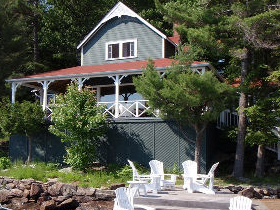
Nathalie Tinti, Partner
Barriston LLP
45 Ann Street
Bracebridge On P1L 2C1
(705)645-5211
The cottage is not simply a building of bricks and mortar. For most, the Muskoka cottage is
magical place that has been the silent spectator of wonderful memories over decades of family
interaction. A strong sentimental bond exists for most families to their Muskoka cottage and as
such, it is more than just an asset that needs to be considered in your estate planning. Many
people wish their Muskoka cottage to be passed down to generations long after their demise.
The transfer of a cottage property, as a gift or otherwise, must be careful considered as it can
result in unplanned tax and estate consequences.
Many aspects of the family dynamics should be considered when succession planning relating
to the family cottage, some of which are:
• How many children/grandchildren are involved in the planning
• Is there a difference in financial capacity of each beneficiary
• Is there a true interest in owning or the property, or are the beneficiaries indifferent
• Is there likely to be future conflict between siblings/relatives when they share not only
inheritance of the cottage, but also the costs associated with its maintenance and
upkeep
• What are the tax implications relating to the disposition and who should pay them
• Who will be responsible for the ongoing ownership costs
• Proximity
• Marriage/Spousal interest
• Access to funds during your lifetime
• Timing
One you have carefully considered the issues relating to your specific family dynamics, the transfer of
ownership of the cottage may be something you wish to consider. The following are a few of the most
common options for ownership regarding succession planning of a cottage property:
1. Inter-vivos Trust
You may choose to transfer the cottage into a trust while you are still alive. On its basic level, this option
allows you separate the control and management of the cottage from its ownership. There are tax
implications on the transfer into the trust (deemed disposition). This does, however, avoid the necessity
of probate upon your death. A trust can also claim the principal residence designation on the eventual
sale. This should, however, be carefully considered as it may affect the ability of the beneficiaries of the
trust to claim this exemption elsewhere.
2. Sell the Cottage to you Children during your Lifetime
This may make good sense if you need the funds from the asset during your lifetime. You can also add a
life interest on title to the cottage to ensure that you are able to use the cottage during your lifetime.
3. Joint tenancy with Right of Survivorship (bare trustee)
This strategy allows the cottage to be transferred during your lifetime to one or more of your children,
as bare trustee/s only. If this option is chosen, there will be no tax consequences on the transfer. There
will also be no necessity for probate upon your death.
If you have determined that you would like the cottage to stay in the family and transfer to more than
one child, it is very important in order to avoid conflict in the future, that ownership terms are dictated
through a shared ownership agreement. If there is no shared ownership agreement, inevitably there
will be disagreement between multiple owners of the property as to how a property is managed. For
example, who determines what repairs are necessary and who is going to pay for them? Frequency of
use often becomes an issue, especially in Muskoka, as there is a relatively short summer season.
Perhaps most importantly, a shared ownership agreement will dictate the options and terms relating to
disposition and buyout.
The Need to Plan Early
Plan for the future as soon as possible. In order to gage your family’s interest in keeping the cottage,
you must have lengthy discussions with your children and their spouses. Tax considerations should be
discussed with your accountant and your lawyer. Eventually, the tax man must be paid. However, there
are many options available to either defer the tax or minimize it. Payment of tax should be a
consideration when conducting your estate planning. Planning ahead will give you time to speak with
your financial advisors and consider all of the options. Once all of the options are carefully considered,
you will be able to make a good decision that suits your specific needs.



 Lesley-Anne Goodfellow
Lesley-Anne Goodfellow